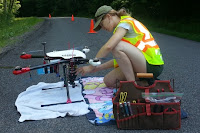An innovation providing key clues to how humans might manage forests and cities to cool the planet is taking flight. Cornell researchers are using drone technology to more accurately measure surface reflectivity on the landscape, a technological advance that could offer a new way to manage climate change.
"When making predictions about climate change, it's critical that scientists understand how much energy Earth is absorbing and retaining," said Charlotte Levy, a doctoral candidate who presented a talk on her research at the annual Ecological Society of America meeting, in Portland, Oregon, Aug. 8.
When a surface reflects solar energy rather than absorbing it as heat, the result is major cooling, locally and globally. The scientific term for the measurement of surface reflectivity is albedo. "Albedo is important to understand because it's one of the main controls for Earth's overall energy budget," said Levy, whose research project is directed by Timothy Fahey, professor of natural resources. She is advised by Christine Goodale, professor of ecology and evolutionary biology.
Using drones, also known as unmanned aerial vehicles, Levy and others have developed a novel method of measuring albedo with more flexibility and accuracy than was possible before.
Climate scientists have long been able to get albedo measurements throughout the United States via satellites and sensors placed on research towers. However, there are relatively few of these, and they cannot be moved to compare the albedo of nearby locations. "The drones allow for measurements to be taken wherever they are needed," Levy said. "We can send one to hover above a forest and then have it fly across the road where the same forest was thinned five years earlier, and we can measure precisely what the difference is."
Read more at Drone Tech Offers New Ways to Manage Climate Change

No comments:
Post a Comment